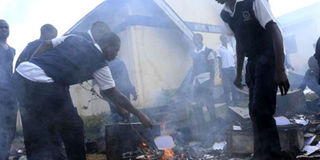Teachers deny exam leak link in fires

Students of Kaimosi Boys High School in Vihiga County search their boxes to salvage valuables after a fire razed their dormitory on July 15, 2016. Head teachers have rejected claims that examination cheats are behind the wave of student unrest in which dormitories in over 100 schools have been torched. PHOTO | TONNY OMONDI | NATION MEDIA GROUP
What you need to know:
- Kenya Secondary Schools Heads Association chairman John Awiti said there was no evidence students were burning dormitories because of tighter examination rules.
- On Wednesday, Mr Awiti said the second term had always experienced cases of school unrest.
- Dr Matiang’i had on Tuesday blamed the wave of arson attacks in schools on frustration by students over failure to illegally access national examination papers.
- And in a preliminary report by school heads, discipline, poor school management skills were identified as among the reasons fuelling student unrest in schools.
- Mr Awiti called for a review of policy on boarding schools saying that the unrest has mostly affected boarding schools.
Head teachers on Wednesday rejected claims that examination cheats were behind the wave of student unrest in which dormitories in over 100 schools have been torched.
Kenya Secondary Schools Heads Association (Kessha) chairman John Awiti said there was no evidence students were burning dormitories because of tighter examination rules.
His views appeared to contradict those of Education Cabinet Secretary Fred Matiang’i, who had on Tuesday said the cartels were to blame for the arson attacks.
On Wednesday, Mr Awiti said the second term had always experienced cases of school unrest. According to him, some of the schools rocked by unrest have never reported cases of exam cheating.
He spoke to journalists after talks with Teachers Service Commission Chairperson Lydia Nzomo and CEO Nancy Macharia among others at the Kenya Institute of Curriculum Development (KICD) on emerging issues in learning institutions.
“There is no tangible evidence to link examination cheating to school unrest,” said Mr Awiti noting that there are a lot of speculation about the causes of the fires.
Dr Matiang’i had on Tuesday blamed the wave of arson attacks in schools on frustration by students over failure to illegally access national examination papers.
He said he had information from police and headteachers that students had already paid for the papers but the teachers who abet cheating had been unable to procure the tests after the government dismantled the cartels which used to distribute them.
And in a preliminary report by school heads, discipline, poor school management skills were identified as among the reasons fuelling student unrest in schools.
The report, which is set to be discussed during talks to be chaired by Education Cabinet Secretary Fred Matiang’i on Thursday, says: “There are too many stakeholders at school management level that want to have their way in education matters, therefore creating confusion.”
AVOID CONFRONTATION
The report also notes that students’ councils at school level need to be strengthened to address emerging issues.
On Thursday, Dr Matiang’i will meet headteachers and religious leaders to seek a long-term solution to the problem.
In a statement to newsrooms on Wednesday, Education Principal Secretary Bellio Kipsang said: “The Government... urges students, teachers and school administrators to be calm and avoid confrontation and destruction of property by deliberately addressing issues of concern to the school community”.
Dr Kipsang said security institutions had put in place systems to ensure the safety of students and school property.
At KICD, Mr Awiti called for a review of policy on boarding schools saying that the unrest has mostly affected boarding schools.
“We need to understand why children are only concentrating in burning dormitories and not administration blocks, laboratories and classes. There is an issue with boarding,” said Mr Awiti.
He said national examinations are about two months away and there was, therefore, need to contain the situation to allow students to sit the exams in a conducive environment.
“We want a credible examination for our candidates and that is why we are doing everything possible to ensure that there is a success,” he said.
LOOK FOR SOLUTIONS
Dr Nzomo said school unrest was a national issue and should be taken seriously. According to her, the problem can only be solved by talking to each other.
“It should not be a blame game. Instead we should look for solutions,” she said.
Parliament’s Education Committee Chairperson Sabina Chege called for an end to the blame game.
Ms Chege said there was need to punish those who are involved in the unrest.
“We should look at the environment our children are living in in boarding schools. Previously they were the best places but today things are not good due to the bad environment,” she said.
In Eldoret, former Education permanent Secretary James ole Kiyiapi told a press conference at the Boma Inn hotel that schools should be closed immediately to break the cycle of arsons. He also said a meeting for all education stakeholders should be convened urgently to resolve the issue.
In 2015, Machakos had 12 cases of unrest while Kilifi County had 16. Counties that had the highest number of cases last year have so far not reported any problems except for Meru and Nakuru that have a comparable number of incidents in the two years.
So far, Kericho, Kisii and Nyamira have recorded the highest number of arson attacks.
In last year’s Kenya Certificate of secondary education (KCSE) examination, 46 out 47 counties were involved in examination irregularities.
Only Isiolo County had no case of examination regularities. Makueni, Nairobi and Meru had the highest number of examination centres involved in irregularities.





